Esoma Bay, Havannah Harbour, Vanuatu

Lochmarin
Sat 19 Sep 2015 22:56
17:33.1S 168:16.9E 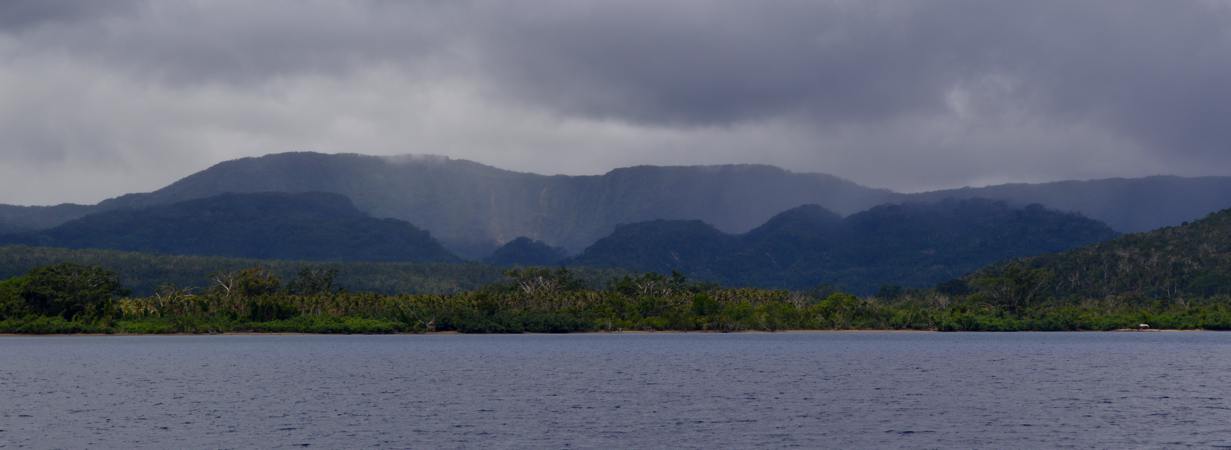 The caldera towering behind our anchorage in Esoma Bay. The gardens are under the coconut trees just in from the shore. At first light we were up and off, braving the over falls around Devil’s Point. We set off before the wind had a chance to build and stayed quite close in, it was bumpy for a while but no problem. Dolphins came to join us for a while, small sleek ones - I think a type of spinner, but they weren’t spinning, just bow riding with us for a while. 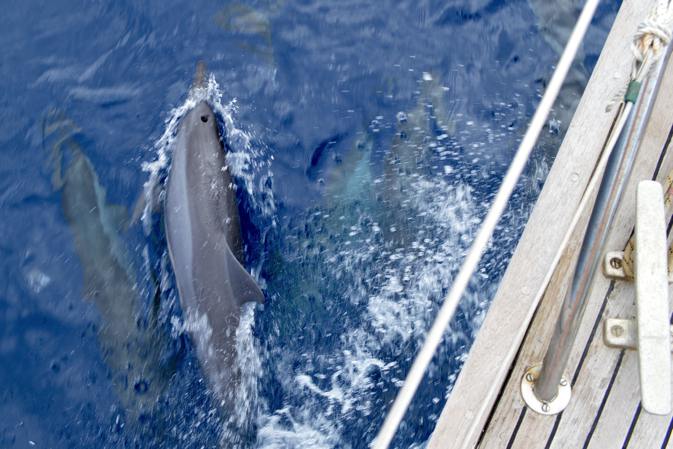 We anchored right up at the top of the bay and almost immediately saw turtles around the boat. We’d come to love these peaceful grazers when we were in the Caribbean, there’s something so restful in quietly watching a wise face peep up from the surface as he takes a breath, once, twice, then seeing his shell bob up as he duck dives back down to feed. Soon after we dropped the hook we were hailed by a man on the shore. Phil took the dinghy over to investigate: Kalo had been left behind and wanted a ride across the bay to Moso Island where the village was. The villagers have gardens on the mainland but live out on the island so they went back and forth past us each day. Kalo promised to bring us fruit and veg the next day, wanting a pair of shorts to trade for it. He said it would be fine to go across to look at the gardens so Phil, Jan and I went exploring. The gardens were in great shape, although evidence of Cyclone Pam was clear to see in the fallen trees and stubby, branch free trees still standing. Before long we were over taken by a family, Roland, a minister in the village, his wife Anna and her sister Annette. They were on their way to work in the gardens, getting ready to take the crops to market the next day. The ladies would go on Tuesdays and stay until Saturday, sleeping under the stall. We offered to help so, chattering as we walked, we followed little winding paths through other gardens, across the island ring road, and on to their crops. We spooked a couple of flying foxes as we went, they were huge! Two, maybe three feet across! They was the first I’d seen and I thought they’d be much smaller. Anna cut a few stout sticks to throw at them should we spook some more - they made good stew! There was other evidence of them living off the land: next to the lettuce patch they had made a trap for wild fowl - chickens basically, baited with coconut. Roland told us he’d caught two in there the previous day. 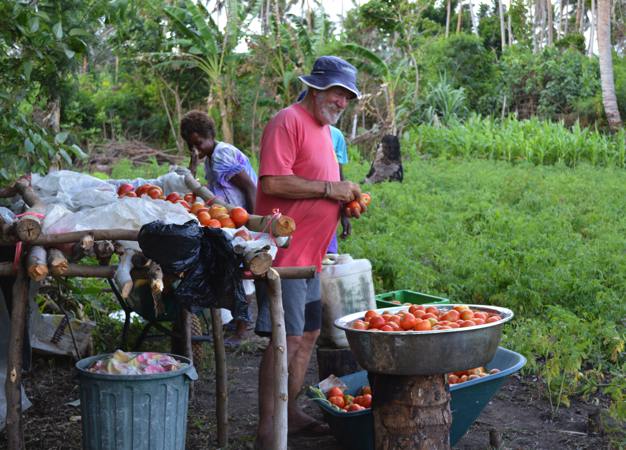 Phil packing tomatoes for market. The green tomatoes are left on the platform to ripen, covered with plastic to keep off rain. In the garden I helped Annette husk coconuts whilst Phil graded and packed tomatoes ready to be picked up by the pickup truck in the morning. Roland made a fire of coconut husks and cooked us sweetcorn, served on leaves, whilst we worked. It was good to help out, and easy to talk, finding out about each others' way of life, whilst working alongside. We found out that Anna and Annette came from Tanna, Port Resolution where we’d made first landfall in Vanuatu. When we were done we invited them back to visit on the boat, and of course they pressed plenty of fresh veg on us. Back on board we made a cup of tea, I got the computer out thinking the ladies would like to see the photos of Tanna that we’d taken - they were delighted, pouring over the photos working out who was who, reminding each other of names. It turned out that the snap of an older man with a young boy fishing that I’d taken was of their father and little brother, who they’d not seen for years. We printed some out for them, of course, and gave them some little gifts: body cream for the ladies, a mug for Roland, before saying goodbye. We’d made firm friends. 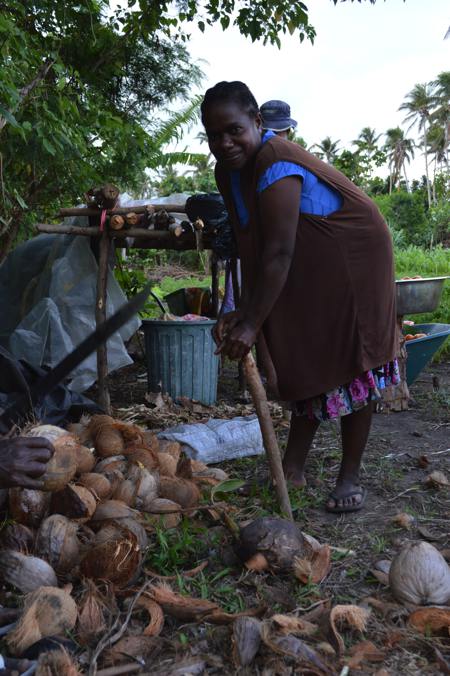 Annette husking coconuts. I got quite good at it. I was aiming for one for every two Annette did but ended up managing a little faster than that! Next day all four of us went out in the dinghy to explore the bay a little. There was a very impressive wreck from Pam up at the North of the bay, next to a small village of not more than 10 houses. The boat must have been 85ft long and dwarfed the houses it had washed up next to. 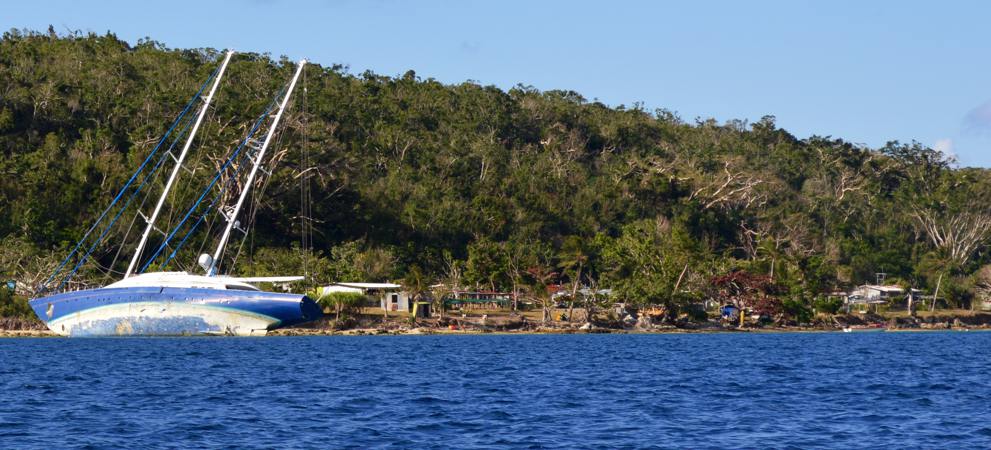 Imagine seeing this headed across the bay to crash into the reef just in front of your house! It must have been terrifying. We went to visit the village our gardeners had come from: Tassiriki Village, on Moso Island. A lady called Alwin greeted us and showed us around, her husband was unable to take us as he had a broken leg. She explained that she’d been living in Fiji, in Suva, because her daughter was at the University of the South Pacific in Suva, studying to be an accountant, and had only just returned a couple of weeks ago. She was sorting out her possessions, having found everything had been sitting soaked and going mouldy since cyclone Pam. Pretty soul destroying. The village was very tidy, a mixture of houses and outbuildings, some made from traditional thatch, some concrete and corrugated iron. There were three or four churches - Alwin explained that Vanuatu has free church, one can worship any type of religion one wants, and there were open spaces in between the buildings with hedges demarcating different areas. The open spaces had tidy short grass covering it and I was intrigued - who kept it cut? Alwin explained that it just didn’t grow any higher, the hot sun kept it in check. Imagine: never having to cut the grass! 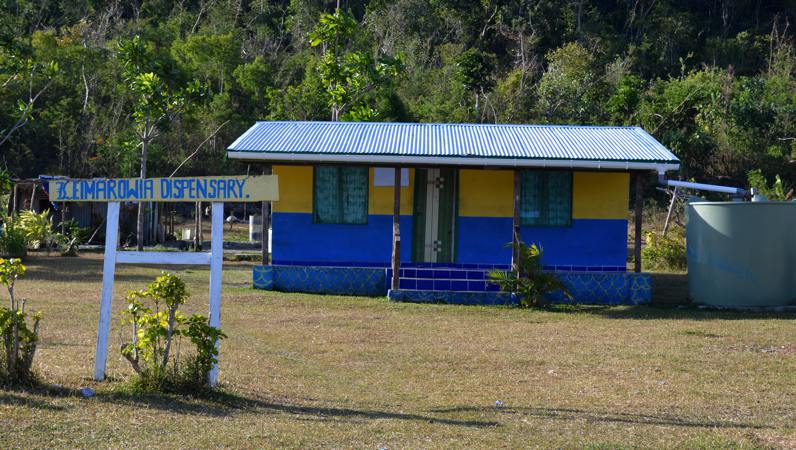 Self regulating grass surrounding the clinic. We were greeted everywhere we went, folks asking our names, telling us theirs and asking where we come from. The paramount chief wasn’t at home but we were introduced to one of the other chiefs. I particularly wanted to visit the school, professional interest always makes school visits fascinating. The school was 25 minutes walk away but Alwin left her chores and gave up her time happily. School had just let out by the time we arrived but the Head Teacher Paul and the Class 1 and 2 teacher, Anna, were there and welcomed us. Paul explained that he was down a teacher. He’d had a trainee teacher but her wages hadn’t come through so she’d left. He took Class 5 and 6 but Class 3 had no teacher. I offered to come in the next day and help out, he was very happy to accept my offer.  Outside beachfront living space. Before we return to our dinghy Alwin took us back to her house and got us drinks of water from the rainwater tank. Although there were wells for washing clothes and cleaning, drinking water was getting scarce as there’d been very little rain for some time. She was a generous and attentive host, answering our many questions tirelessly as she showed us around. Coming back though the village we saw that the people had returned to their homes. The women and men from the the gardens, the fishermen from their boats and the children from the school. The women were starting to prepare the evening meals, the men were at their usual evening occupation - boule. Some French influences are worth holding on to. 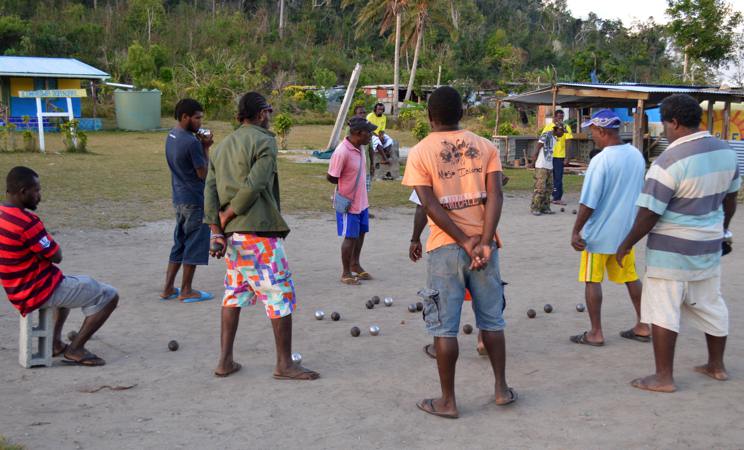 |